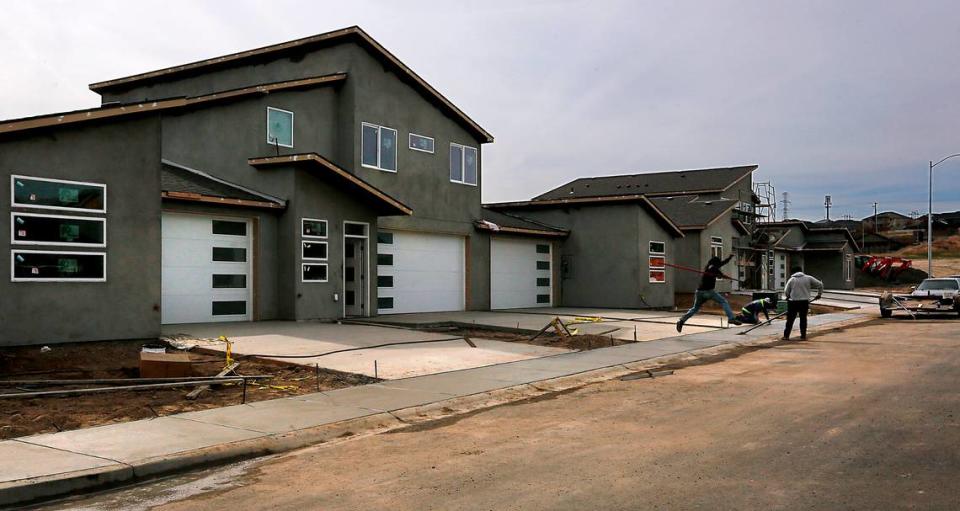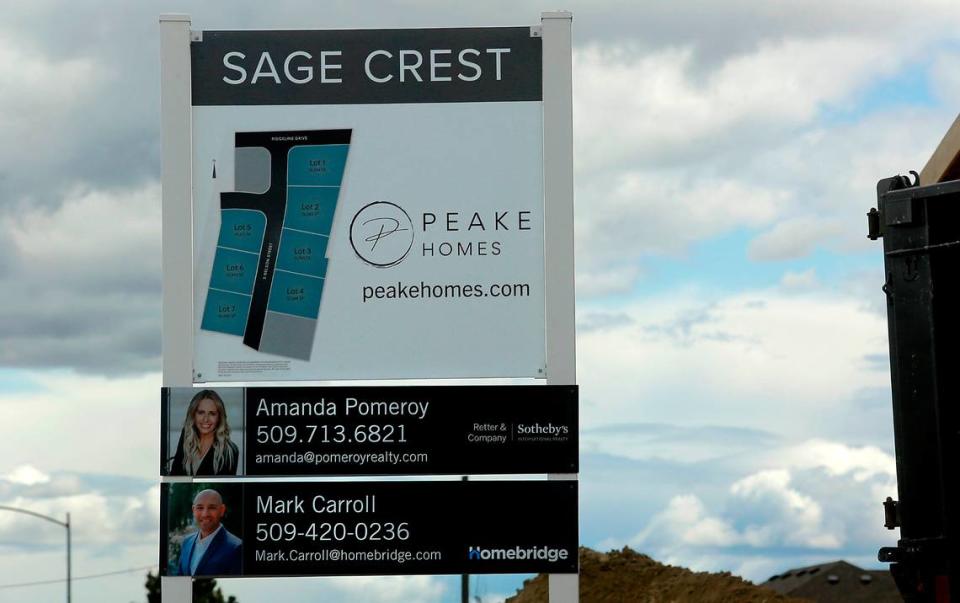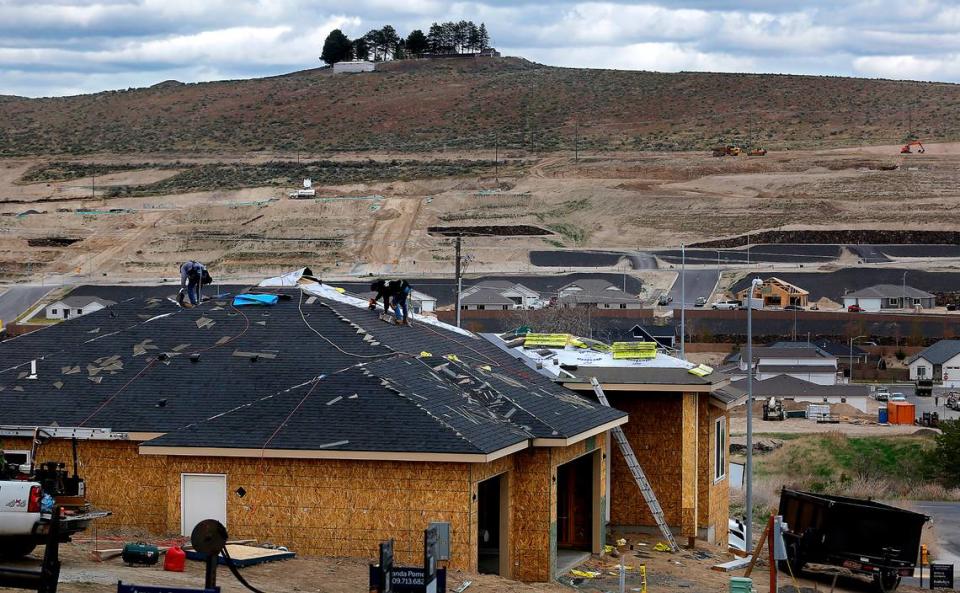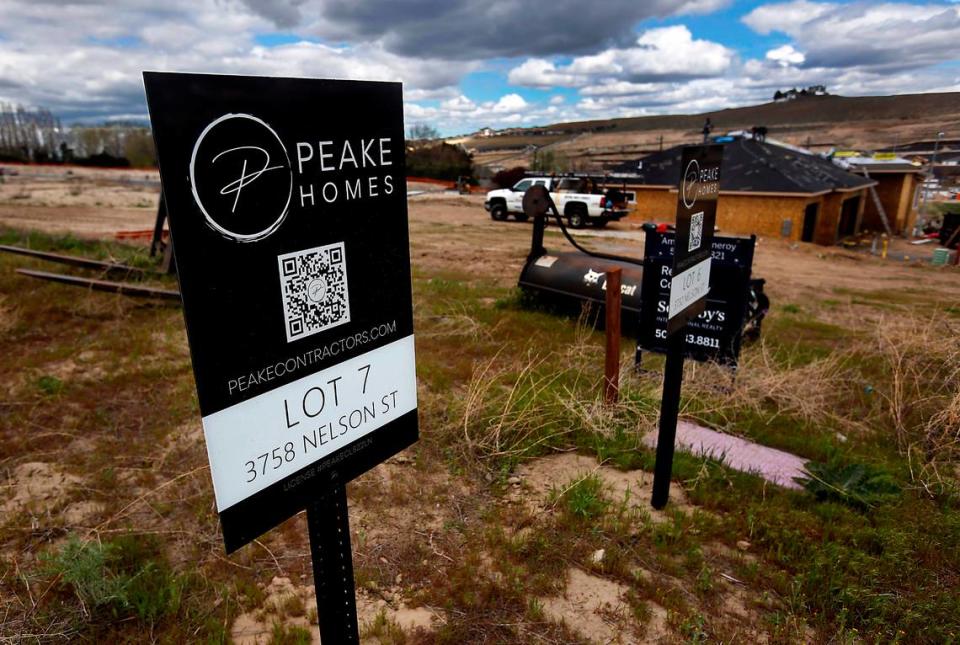Can your neighbors turn their house into a duplex? What new WA laws mean for Tri-Cities
A slew of long-in-the-works “Middle Housing” laws were adopted this year, but Tri-Cities homeowners likely don’t need to worry about their neighbor splitting their house into a sixplex.
What they do need to be aware of, though, is how development of neighborhoods is going to change over the next few years.
Those already in homeowners associations have the most insulation and protection from the major changes coming.
What to expect
Jeff Losey, president of the Home Builders Association of the Tri-Cities, told the Herald that existing homes and subdivisions aren’t likely to see major changes, but builders will likely shift the way they approach new developments.
Losey cited Badger Mountain South as an area already doing this, with builders having the option to use corner lots for duplexes.
“There’s going to be more flexibility when it comes to builders and developers, but less predictability for homeowners,” he said.
Losey said when the laws take effect after June 30, they effectively spell the end of single-family residential zoning.
He said that doesn’t mean you can’t build single-family homes, just that developers, homeowner associations and cities can’t ban multi-family homes in new developments.
Multi-family homes doesn’t mean apartment complexes, but rather duplexes, tri-plexes, quad-plexes, and in some cases six-plexes.

Common Interest Agreements, which is an umbrella term for Home Owner Association (HOA) agreements, which exist before June 30, 2023 are exempt from the density changes, unless they are old racially-restricted covenants which the state already invalidated.
Losey said in residential areas previously zoned single family without an HOA, if a house were to burn down or be destroyed, that could mean the owner could rebuild a triplex on the property. They could also look into splitting large lots.
He noted that Washington isn’t a particularly landlord friendly state, so he doesn’t expect a lot of individuals to start splitting their property.
“There’s no change if they’re with an active, current HOA, they’re not going to see a change in their neighborhood,” Losey explained.
“I think that it’ll certainly allow for more creativity with developers in coming up with more innovative development plans in a way that will meld together,” he said. “I think the rub is going to be in the places that don’t have an HOA, if you don’t know what’s going to be built around you, that’s where the heartburn is going to take place.”
That could lead to a rush of communities looking to incorporate HOA agreements before June 30.

Population size restrictions
Also, each city in the Tri-Cities area falls under different rules because the rules vary by population size.
Pasco and Kennewick will see previously single-family lot sizes that allowed up to four units, with the ability to go to six. If the developer chooses to go for six, then at least two of the units have to fall under the state’s affordable housing guidelines.
Richland will see lots allowing up to two units, with the ability to go to four. West Richland won’t have minimum restrictions due to a provision that exempts cities with fewer than 25,000 people.
If Benton County grows larger than 275,000, or if West Richland hits 25,000, they could be moved into a category similar to Richland, but that’s likely decades out with the current population of West Richland at 17,000 and the county about 215,000, according to U.S. Census data.
Kerwin Jensen, Development Services Director for the city of Richland encouraged homeowners with questions to reach out.
“It will allow greater opportunity for higher density housing, which sometimes may translate into more affordable housing,” he said. “Not always, but it certainly will provide an opportunity for more housing options.”
Pasco already has a new housing plan that they enacted before the state passed its middle housing laws this year. Pasco City Planner Jacob Gonzalez said their plan allows many of the same provisions, but they have been customized to fit their needs.

“Prior to the changes, attached housing, duplexes, townhomes were restricted on more than 85% of the city’s residential zoned lands,” Gonzalez said. “When we went through the changes before the recent state legislation, we made some changes to our zoning codes that allows multiple forms of housing and now Pasco allows multiple forms of housing on more than 80% of our land.”
He said their approach focused on what made sense in Pasco, and what residents wanted to see more of.
“I think one of the things we’re really excited about that we did in Pasco was that rather than do one of the one size fits all approach, we really wanted to increase housing in areas residents wanted more access to, increased threshold near areas like parks, schools, (and other places),” Gonzalez said. “I think in a sense, Pasco’s current zoning code, and what we did, is more practical for us, but it’s also more aggressive.”
Gonzalez said he expects that some developers who have submitted plans to build new communities may come back to the city with adjusted lots to take advantage of the state’s changes in zoning.
They’re also expecting more homeowners to inquire about adding Accessory Dwelling Units (ADUs) or splitting their lots, but he doesn’t think it’s going to set off a mad dash.
“Particularly folks that have larger lots or maybe want to accommodate mother-in-law suites. We really wanted to make it practical for residents,” Gonzales said. “We’re not mandating, and the state isn’t mandating everyone builds sixplexes, it’s just an option.”
Multiplex boom
Since Pasco made changes to its plans, they’ve seen something of a boom in developments for duplex and triplex communities within the city.

These stand apart from the future developments over in the Broadmoor area, with many already starting to rent.
With plans for thousands of lots for new single-family homes already drawn up in the Broadmoor development and to the north of Burns Road, builders will have the option to take a look at those lots and see if splitting them further makes sense.
“If there’s a product out there that residents are going to need, our more flexible options will allow it,” he said. “I think for those builders that want to remain adaptable for the changing needs of the community, they may see options for more of a blend for their development. I would expect we’ll see more interest and developments that more than one kind of housing”
Gonzalez also said the city is currently doing another housing survey, to get a finger on the pulse of what the community feels is most needed.
“The idea is that there’s more flexibility, we have a shortage of housing, that’s been well document, and Pasco has really taken an aggressive approach,” he said. “Now we’re looking at policies to fill in gaps.”
Gonzalez said he’s excited they’re able to move some of these changes forward, because housing availability in the Tri-Cities will remain an issue for the foreseeable future.
If you’re a Pasco resident and are interested in taking the city’s new housing survey, it can be found here, or at this link in Spanish.
ADUs and tiny homes
Most areas of the Tri-Cities already allow accessory dwelling units.
ADU is a fairly broad term that applies to a variety of structures. The city of Pasco has a comprehensive ADU guide covering everything from financing to building one.
So what is an ADU?
The term encompasses structures such as mother-in-law cottages, which are considered a standard detached structure, garage conversions, an addition to your home and attic and basement conversions.
Things like an RV or motorhome are not considered ADUs.
ADUs also have to meet residential building codes. You can’t just slap a shed in the backyard and call it a cottage.
Changes by the state remove the need for the owner to live on site, as well as alleviate onsite parking rules and allow two units per lot.
Most previous ordinances only allowed one ADU. That means you could now have a garage apartment and a backyard tiny house.
It also sets a height limit for freestanding ADUs at 24 feet, and cities cannot establish maximum sizes for units smaller than 1,000-square feet.

